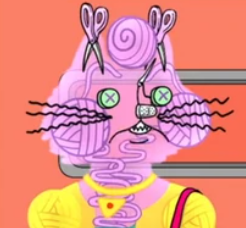Season 6 episode 12 of tng "Ship in a Bottle" at the end Patrick Stewart says, "who knows, maybe our reality is just an elaborate simulation..." That shit was from like 1993
This is actually a surprisingly old concept, with various flavors throughout history.
The Butterfly Dream is somewhat popular today
https://www.philosophy-foundation.org/enquiries/view/the-butterfly-dream
spoiler
Chuang Tzu was a philosopher in ancient China, who, one night went to sleep and dreamed that he was a butterfly. He dreamt that he was flying around from flower to flower and while he was dreaming he felt free, blown about by the breeze hither and thither. He was quite sure that he was a butterfly. But when he awoke he realised that he had just been dreaming, and that he was really Chuang Tzu dreaming he was a butterfly. But then Chuang Tzu asked himself the following question: "was I Chuang Tzu dreaming I was a butterfly or am I now really a butterfly dreaming that I am Chuang Tzu?"
Also there are writings from Greek, Indian, and Aztec Philosophers that had different ideas about reality being a painting/book/dream of the gods which is not that far off from Simulation Hypothesis all things considered.
You could absolutely see the Allegory of the Cave as a kind of matrix stand-in!
I came across this idea here which is referring to different (established) understandings of Aztec Metaphysics
The Nahuas characterize the ever-changing aspect of teotl in two seemingly deceptive ways that raise important issues pertaining to the possibility of knowing reality. One of these ways is through the creative, aesthetic concept of in xochitl in cuicatl or “flower and song.” The Nahuas thus conceive the generating and regenerating activity of teotl as an artistic creation. Accordingly, the world and entities within it are the artistic creation and recreation of teotl. Nezahualcoyotl expresses this view through the metaphor of a “book of paintings” that is the world in which we live (ibid.). Entities in the world, including human beings, are thus paintings in the book of teotl. The second seemingly deceptive way in which the Nahuas conceive the generating and regenerating aspect of teotl is through the concept of nahual, which is a shamanic form-changing transformation. Maffie explains that, “the word nahual derives from nahualli meaning both form-changing and the being into which a shaman transforms” (Maffie 2014, p. 39). Teotl thus transforms and re-transforms itself into different guises such as animals, human beings and other entities in the world. This seemingly deceptive artistic and shamanic conceptions of teotl raise questions regarding one’s epistemic access to reality. That is because teotl not only appears as illusory, as in the case of paintings, it also appears as disguising, as in the case of its shamanic transformations. In both cases, reality thus appears as other than itself—therefore the disguising characterization of teotl.
And to describe it as "life is just something the gods wrote ina book" was a reductive way to put it but here we are
Thanks a lot for showing me this! I love reading (and getting sad) about pre-colombian civilizations
I have definitely had those types of dreams before - you wake up from a life that you feel was true and real.
To bring it back to Star Trek, I think Inner Light captures that to some extent.
I believe The Matrix was partly inspired by the 1984 (lol) book Neuromancer , which had a similar "virtual reality" concept
That's a good episode of TNG
I knew the etymology of matrix but I din't know that.
Etymology: late Middle English (in the sense "womb") from Latin, "breeding female", later "womb", from mater, matr- "mother".
—————————————————————
The matrix has its roots in primitive arcade games. … Cyberspace. A consensual hallucination experienced daily by billions of legitimate operators, in every nation, by children being taught mathematical concepts. … A graphic representation of data abstracted from banks of every computer in the human system. Unthinkable complexity. Lines of light ranged in the nonspace of the mind, clusters and constellations of data. Like city lights, receding.
The 1999 cyberpunk science fiction film The Matrix particularly draws from Neuromancer both eponym and usage of the term "matrix". "After watching The Matrix, Gibson commented that the way that the film's creators had drawn from existing cyberpunk works was 'exactly the kind of creative cultural osmosis" he had relied upon in his own writing.'"
Funnily enough, I was just listening to Wallace Shawn’s The Fever which came out in 1990 (Wallace Shawn later becoming the grand negus of course)
As I listened, I couldn’t help but see his depiction of a certain stage of becoming conscious as very similar to the red-pill, as portrayed in the matrix.
Below, I’ll put the passage in a spoiler tag (it is around this part that, without fail, I start crying for real).
Wallace Shawn performing (video):
-
Part 1: https://podcast.lannan.org/2010/05/05/wallace-shawn-reading-part-1-15-december-1999-video/
-
Part 2: https://podcast.lannan.org/2010/05/05/wallace-shawn-reading-part-2-15-december-1999-video/
Text: http://wischik.com/lu/senses/fever.html
Somewhat extended quote (I think it represents a critical inflection point in the tone of the play and therefore would best be encountered by watching/reading the whole thing. But it’s long so whaddya gonna do
Dear God, every muscle in my body aches with the effort of constant lying. I'm twisted, contorted—lying from the minute I get up each day till the minute I go to bed, and even when I'm asleep I think I'm lying. I can't stop, because the truth is everywhere, it's in plain sight—
Listen to me, my darling. Just let it happen, just let it happen for this moment, just for tonight, and then we'll go back to lying again, as if it never happened. We'll pretend that it never happened. We'll forget that it happened.
All right, go ahead. Go ahead. Say it.
The life I live is irredeemably corrupt. It has no justification. I keep thinking that there's this justification that I've written down somewhere, on some little piece of paper, but that it's sitting in the drawer of some desk in some room in some place I used to live. But in fact I'll never find that little piece of paper, because there isn't one, it doesn't exist. There's no piece of paper that justifies what the beggar has and what I have. Standing naked beside the beggar—there's no difference between her and me except a difference in luck. I don't actually deserve to have a thousand times more than the beggar has. I don't deserve to have two crusts of bread more.
-
coincidentally this first aired 26 March 1992
https://en.wikipedia.org/wiki/Back_to_Reality_(Red_Dwarf)
It has a similar concept based around a hallucinogen that makes you imagine a new reality that makes you despair to the point of suicide. In the episode the hallucination transitions into a separate reality (ostensibly the 'real' one) via the characters believing they've been in a VR game for 4 years, and just lost the game and awakened.
It has been described as a "classic episode [that] questions our certainty about what is real. It has us believing that what we thought was real was only a simulation of dream, only to reveal later on that the waking up was actually a falling asleep."









